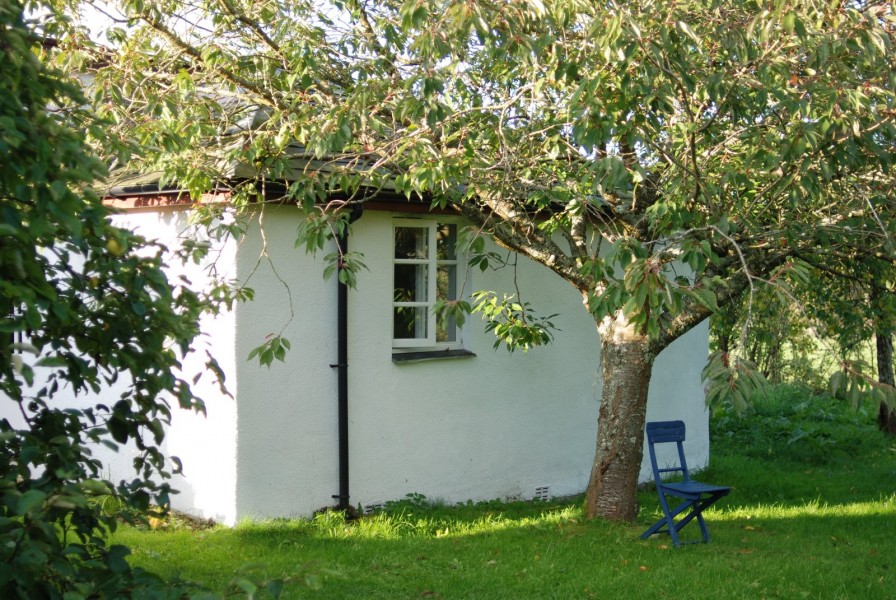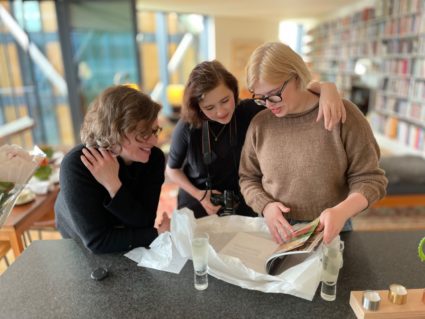Day Four, naturally

 I’ve suddenly realized: I have not described to you anything about Totleigh Barton itself! That must be rectified, because the atmosphere was really inextricable from the experience. No one can ever tell me that one can learn anything anywhere: well, maybe so, but one learns better in beautiful, historic places. That’s just the truth.
I’ve suddenly realized: I have not described to you anything about Totleigh Barton itself! That must be rectified, because the atmosphere was really inextricable from the experience. No one can ever tell me that one can learn anything anywhere: well, maybe so, but one learns better in beautiful, historic places. That’s just the truth.
Totleigh Barton is, as all the literature told me solemnly, a “pre-Domesday thatched manor house.” I ingested this information without any real idea what that meant. Thatch, I understood, but pre-Domesday signified nothing, ignorant American that I am. So I’ll tell you: it’s to do with a book, as most good things are, I find. The Domesday book was commissioned by William the Conquerer in 1086 as the most comprehensive land survey in the world. A contemporary observer of the compilation remarked “there was no single hide nor a yard of land, nor indeed one ox nor one cow nor one pig which was left out.” Pretty impressive, that.
But for our purposes, I have to aver that the house we stayed in, while very very old, is certainly not a medieval manor house. The important thing is that there has been a house, on that spot, since before the Domesday book was compiled. Presumably whoever lived there in 1086 is included in the book! I don’t know any more than that. But Totleigh Barton itself must be several hundred years old. The floors were made of GRANITE. Can you imagine? A glass dropped on the kitchen floor sent shattered shards into the adjacent counties, I am quite certain. The ceiling beams in the kitchen were so low that I am convinced Edward in particular lost a fair number of IQ points bumping relentlessly into them, poor man. We were an unusually tall bunch of food writers, it would seem, so care was taken.
Can I describe to you the complete unsuitability of the kitchen as a room for preparing food? I have to remember that food writing is but one topic covered at Totleigh Barton and presumably the rocket scientists who followed or preceded us did not care one whit that the only truly practical thing the kitchen was capable of emitting was fried mushrooms. There were two ovens, but only one worked. Well, the other might have worked, but the wailing, whining, thumping sound the internal fan made caused us to turn it off in heart-thumping dismay. The oven that did work, did so only under duress. Its door tried to remain open at all times, its temperature was quixotically independent of any measuring, ordering or predicting. The stove top was so inefficient that Tamasin’s carrot soup had to be put into three separate pots in order to achieve even the most modest simmer at a time even approaching past lunchtime.
And the lighting? Or lack thereof? My dears, it was like cooking in a cave, lit by a single torch hanging by a string in the center of the enclosure. There was one enormous dangling LAMP that suspended itself pugnaciously over the kitchen table (whose evidence of absolutely no proper hygienic scrubbing made me frantic all week: I kept promising myself I’d creep down at 2 a.m. someday and have at it with a bleachy sponge, but alas, it never happened). There was, unaccountably, a truly superb chopping knife, and my explanation for that is quite simple: no on in the history of Totleigh Barton before us had ever attempted to use it. Enough said.
The inadequate flat surfaces that we were meant to cook on were taken up almost entirely by teakettles as far as I could see. The British! Honestly, it’s the largest group of the creatures I’ve ever been exposed to in captivity, and the numbers of cups of tea that they require to function is staggering. How do Americans manage to get through a productive day without beginning to talk about a cup of tea at 11, frantically longing for it by noon? And again at 4, or 5? They would all all troop relentlessly into the kitchen and crowd around those *&^% kettles, making up odd pronouncements about which sorts of tea could receive milk and which for whom the addition of a dairy product is tantamount to treason.
And every day a new cake mysteriously arrived into the kitchen, to be fallen on by these dear people as if on a moose carcass by starving hunters. It was fascinating! Every time I think that some little fact about life in Britain is exaggerated (the rain, the bad food, the obsession with minor celebrities, the devotion to one’s football club, their TEA), I’m faced with the undeniable reality: a whole lot of them with their little mugs, every single day and you realise it’s all true. And, I might add, they will have their tea no matter WHAT ELSE is meant to be happening in the overcrowded kitchen to begin with! There I was, washing interminable pots at the tiny sink (I DID scrub that one), and one of my fellow writers would hang disconsolately over my shoulder, asking plaintively, “Could I get just a little cold water, Kristen? Thanks SO much.” Sigh.
But I am distracting myself.
Day Four.
One of the wicked things about being with a lot of other storytellers, yarnspinners, is that a fair amount of embellishment, dramatisation, not to say outright invention goes on. Which is what happened with… Day Four. For some reason, in the kitchen at breakfast (read, cup of ginger tea for me just to fit in, while everyone else was doing massive fryups and Tamasin and I were hard at work on a stock), I said, “You know, it’s Day Four.” “Yes, what difference does that make?” some innocent person asked, but Tamasin jumped right on it. “I’ve been on Day Fours on photoshoots that you would NOT BELIEVE.” “Exactly,” I said. “Day Four.”
By that afternoon, everyone was asking everyone else how “Day Four” was going: was it living up to expectations, had any “Day Four” things happened, etc. Sheer suggestive nonsense, but good fun. Edward and I walked into Sheepdip, I mean Sheepcurd or Sheepwash or whatever the nearby village was called, just to clear our heads. We ducked into the pub and were greeted with, “I’m just closing up now, mind,” whereupon Edward ordered a pint and I ordered… a pint of cold water WITH ICE. “I never saw anything like that barman’s face. Ice *&^% water? After he stayed open for us…” We sat out in the sun and discussed life, feeling we’d escaped school for a bit. Massively long walk back, somehow so much longer than the walk there, and UP and DOWN. Both of us felt it in our calf muscles the next day! But glorious weather, in a place where the saying is, “Welcome to sunny Devon, where it rains six days from seven.” Not for us, not for the food writers of Totleigh Barton. We were blessed.
Day Four. There was a palpable sadness, at least for me, that I couldn’t pretend it was only halfway finished. The fact was, it was the Next To The Last Day. I have written in my journal from the day, simply, “Fabulous.” And it was: chatting about our writing plans, our dreams of what we can accomplish, running the brilliant tutors’ ideas past each other for moral support, and as an underscoring of how HARD they are working to give us something… and to great results. At one point Orlando, with his seductive combination of hard criticism and self-deprecating identification with us, said, “I think it may be possible that what some of you have learned this week is that you do NOT want to be food writers…” The only point at which I felt this was during what I termed “recipe hell.” Have you any idea how bloody specific you have to be in writing a recipe? They set us a fascinating test: watch them go around the kitchen creating something unnamed (never mind that we practically all had to have individual torches, the lighting was so abysmal, and everyone hit heads on the beams, AGAIN), and were allowed to ask about what ingredients and quantities they were using, method and practice, and it turned out to be little choux pastries. Then it was off to the barn to turn our impressions into… a REAL recipe. Consistent with the methods, measuring standards, wording standards, of whatever publication we planned to submit to. My God, it was exhausting. In the way that something can be exhausting that doesn’t involve any physical effort whatsoever.
Tbsp, or tbsps if plural? Herbs measured before or after chopping? Water mentioned in recipe ingredients or no? Just the term “seasoning” or salt and pepper in the list of ingredients? And how to describe the finished dish? A list of words we are NEVER allowed to us: first and foremost among them “delicious.” Just not on, not allowed. As also, “crispy.” “Crisp” should be good enough for any red-blooded food writer, it was dictated. “Unctuous” is overused and a problem child. Immediately none of us could produce any piece of prose that did not involve these words. You try it! Take a word off the table and it’s the only word that will do. AT ALL.
Through it all, all morning long as we persevered and memorized and took notes and listened intently to all the wisdom being offered, COWS marched past the low windows of the barn and COWS stared in at us. I defy you to sit quietly and take notes about how to pitch a piece to the Guardian when an enormous COW has stopped, looked in the dusty window at you, mooed, and moved on. Simply priceless.
What came out of so much of our instruction was painfully simple, and yet surprisingly difficult to make happen: BE TRUTHFUL. Tell the truth. Tell a proper story with ACCURACY. In a restaurant review, pick out the ingredients and discuss them. If you can’t tell, ask a waiter. Get into the kitchen and see what’s happening. All through this, both Tamasin and Orlando talked fast and furious, giving me the definite sense that we could listen to them all day, every day, almost infinitely, and there would be still more they could impart. How they accomplished such a complex, varied, high-flying set of points for us to digest without having done this before together, I cannot fathom. It was lightning fast, not a wasted word, and we simply THOUGHT and worked.
One of my favorite bits: Orlando’s Magic Three Qualities in Writing: and each of us is good at only two, and has to slave at the third.
RESEARCH
WRITING STYLE
STORYTELLING
Go on, think about it. What is Jamie Oliver good at? Well, probably research and writing style? What is Simon Hopkinson good at? Writing style and storytelling. What is Martha Stewart good at? Research and storytelling. But we can’t do all three, naturally, well. Two come naturally and third is hard-won by sheer hard work. Fair enough. I know for certain that I can tell a story and my writing style, if not brilliant, is MINE. But research? Never stirred a heartbeat. Lovely.
Day Four. Intense.
You know what? The food got better. Lunches were a mystery to me, strange concoctions that were better left to one side for more mundane salads. The cooking at night got better as the friendships one depended on to produce the food got stronger. Each dinner prep had its own Zen. I will wait until tomorrow, Day Five, to describe to you the joys of cooking with Edward, Charlie and Roger. Me and the boys. It was a hoot.

